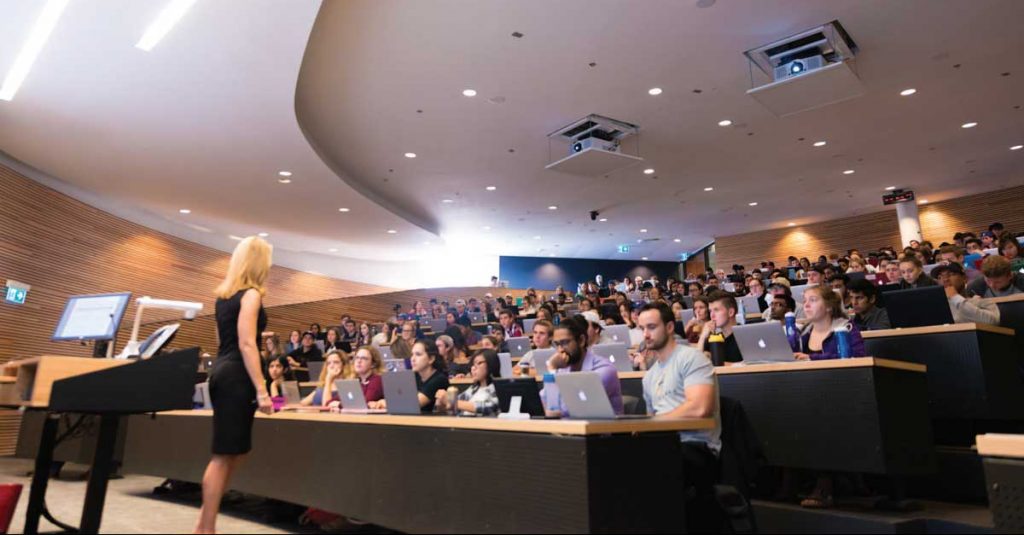What Toronto MBA Can You Earn in the Least Amount of Time?

It’s easy to see why earning an MBA could be a huge boost to your career—but if the thought of putting those things on hold for two years while pursuing your degree is a source of great anxiety, you are not alone. Many who might otherwise have the ambition and skills to thrive in an MBA program may simply not have the option of putting their life on hold for two years and enrolling in school full-time. This can mean that many talented and driven individuals won’t have access to the kind of opportunities for advancement and growth that an MBA provides.
Not every MBA program requires two years of full-time work. But part-time and weekend programs can often have the opposite problem for individuals eager to earn their degree and reap its benefits. While such programs allow students to continue working full time while earning their degree, they can often take up to three years or more to complete.
For individuals driven to earn their degree quickly, there are a number of programs that allow students to earn an MBA in under one year, reducing the amount of time without an income and moving allowing for a quick path to the salary increase and advancement opportunities an advanced degree is likely to offer.
In Toronto, many top business schools offer accelerated or abridged versions of their MBA programs that can be completed in as little as eight months.
The Fastest Toronto MBA Programs
Ivey Business School – Western University Canada
The Accelerated MBA at the Ivey Business School is available for students who have recently graduated from Ivey’s HBA program, allowing students to earn their degree in just eight months—without needing to take the GMAT exam. This makes it not only among the fastest Toronto MBA programs you can find, but also among the most unique.
The program takes place over the course of eight months, building on the base of knowledge earned during the HBA program. The courses are designed to refresh students on business fundamentals, while also providing career-centered electives in fields like marketing, finance, entrepreneurship, and more. The program also allows students to pursue study abroad through an optional trip to China, South East Asia, or South America.
The benefits of Ivey’s Accelerated MBA are evident for graduates: 97 percent of students earned an offer of employment by within three months of graduating, reporting an average post-graduate salary of $107,116. About 65 percent of employment offers were also facilitated by the university, demonstrating the indelible benefits of the connections made while in school.
DeGroote School of Business – McMaster University
The DeGroote School of Business at McMaster University also offers an Accelerated MBA for students graduating from a Canadian university with their undergraduate degree in business. Attending full-time, the program can be completed in as few as eight months, making it one of the most time-efficient MBAs available to students in Canada.
By exempting students from the required first year MBA courses, students can earn their degree quickly while also cutting their overall tuition expenses in half and accelerating their path to employment. The program is designed for students who have earned their undergraduate business degree in the last ten years, and have at least one year of professional experience. Students may start the program in either September or January.
Wilfrid Laurier University – Lazaridis School of Business & Economics (Toronto Campus)
The One-Year MBA at Wilfrid Laurier’s Lazaridis School of Business & Economics is a unique program that immerses students fully in an integrated model of business education, asking students to constantly make use of the knowledge gained during the program through team projects, case study analysis, and as consultants for a real business. The degree is designed for graduates from any four-year university with at least two years of professional work experience.

Wilfrid Laurier University also offers one of the fastest MBAs you can earn in Canada, with the One Year Lazaridis School of Business & Economics MBA.
The Lazaridis MBA can be completed in just twelve months, offering one of the best return on investments of any Canadian MBA program. Located in Waterloo, a center of technology and finance within Canada, the One-Year MBA also allows students to choose from over 10 different MBA concentrations, such as entrepreneurship, strategic management, supply chain management, and organizational behavior.
Schulich School of Business – York University
The Schulich School of Business‘ Accelerated MBA allows students to bypass many of the Year 1 MBA requirements, cutting the time it takes to complete the degree by half. The program can be pursued either on a full-time or part-time basis, and can be completed within just eight months with the full-time option. The program is reserved for students who have earned a BBA or BCom degree in Canada within the past ten years. With 89 percent of all Schulich MBA students earning a job offer within three months of graduation from their respective programs, the Accelerated MBA gives students the chance to join the workforce much sooner and quickly reap the benefits of their education.
Rotman School of Management – University of Toronto
For prospective MBAs with several years of professional or managerial experience, another way to quickly earn an MBA is by pursuing an Executive MBA, designed specifically for senior managers and executives. Executive MBA programs, such as the One-Year EMBA at the University of Toronto’s Rotman School of Management, can typically be earned in 13 months or less and are designed to accommodate the schedule of a busy professional. While executive programs typically cost more than other MBA variations, the Rotman One-Year MBA stands out as the fastest EMBA you can earn in the Toronto metro.
The Next Big MBA Career: Global Supply Chain Management

It’s no secret that the world of business is global, fast-paced, and dependent on the movement of goods from one location to another.
As these given features of the business world continue to become more pronounced, those who prefer their “i’s” dotted and “t’s” crossed have started taking their rightful places in boardrooms. Supply chain managers, once considered a secondary or tertiary level of management, have risen to the executive level. In the process, they have become one of the most interesting and lucrative positions in business today.
In a U.S. News article quoting John Fowler, Professor of Supply Chain Management (SCM) in the W.P. Carey School of Business at Arizona State University, he assuredly states that “the average starting salary for our full time MBAs with a specialization in Supply Chain Management was almost $96,000, with a couple of students in the $120K range.” The question remains, though: what exactly does a supply chain manager do?
Supply Chain Management
What’s most interesting about a supply chain manager position is how it has changed over the years— as J. Paul Dittman writes in Supply Chain Management Review, “Ten years ago, the supply chain leader … was a largely functional role that relied on technical proficiency in discrete areas: knowledge of shipping routes, familiarity with warehousing equipment and distribution-center locations and footprints, and a solid grasp of freight rates and fuel costs.”
And while a supply chain manager must remain on top of such functional knowledge today, the position has become infinitely more demanding, with the supply chain manager dealing with processes, inputs, and outputs both upstream and downstream in the creation of a finished product. Thus, supply chain managers must orient themselves toward traditional logistical concerns, but also concerns about raw materials, manufacturing systems, procurements, and marketing/sales. At its heart, the supply chain management position is holistic and complex, and demands a lot from whoever fills it.
Skills Necessary to Succeed in Global Supply Chain Management
While professionals in the global supply chain management field must hone various skills depending on their companies’ needs, the following are some necessary skills for anyone wanting to get into SCM:
- Thinking Globally: Supply chains are increasingly multinational in scope, and so the global supply chain management professional must have deep knowledge of suppliers and customers that span continents.
- Work Sustainably: As sustainable processes become more profitable and more consumers become aware of corporate environmental practices, it is increasingly paramount for SCM professionals to foster and commit to sustainability both upstream and downstream, particularly in the gathering of raw materials.
- Lead Effectively: As SCM positions become more central to organizational leadership structures, the need for charismatic, savvy, friendly, and collaboratively-minded individuals in such positions grows—and the need for such individuals to be able to work cross-company and cross-industry grows, too.
- Have a Tireless Work Ethic: As the demands of the global economy never sleep, SCM professionals should expect to work anywhere between 55 and 80 hours per week, though be compensated handsomely for such non-traditional hours.
The Best Supply Chain Management MBA Programs
There are many wonderful programs in supply chain management, but the following are three of the best, according to U.S. News rankings.
- Michigan State Broad: Eli Broad’s Masters in Supply Chain Management (MSSCM) is a unique program, as it combines onsite courses and learning with online modules, allowing for a more seamless integration of SCM principles into already-existing work schedules and professional commitments.
- MIT Sloan: the Leaders for Global Operations MBA/MS track is among the most elite SCM programs offered, with a defined track for those students who wish to delve deeper into SCM. Companies in the Boston area clamor for students to work on global supply networks after graduation.
- ASU Carey: The W. P. Carey Master of Science in Global Logistics (MS-GL) degree is a nine-month program that prepares those interested in SCM for the complex world of global operations and multicultural perspectives.
How To Break Into the International Business World in San Diego

Known for its beautiful beaches, perfect weather, and being the home to Comic-Con, San Diego is the ideal destination for those seeking serious studies and fun in the sun. Located a mere 100 miles south of the entertainment capital of the world, San Diego is surrounded by some North America’s busiest ports, and due to its location directly on the border with Tijuana, Mexico, large portions of its population and workforce cross the border daily. Aside from being an economic powerhouse, Southern California’s diverse landscape and international visibility make it one of the premier tourist industries on the planet. The advantages of this region are innumerable, especially compared to the rest of the country. Natural Splendor aside, San Diego Also boasts a booming biotech industry and is located in the richest state in the nation. If California was its own country, it would have the sixth largest economy in the world just between the U.K. and France.
San Diego’s multicultural environment and bustling trade economy make it an excellent place to earn an MBA with a career focus in international business. Below, we’ve laid out four of our favorite SD schools to earn the degree.
Our Favorite San Diego International MBA Programs
California International Business University (CIBU)
The California International Business University offers an ideal San Diego international MBA. In addition to the San Diego campus, CIBU has campuses in China, Vietnam, Myanmar, and Denmark, it’s home country. From the time the school was started, its mission was to provide students with a unique international education that would ensure that they entered the business world with a well-rounded perspective upon graduation. Since the school has only 300 students, it is an excellent option for students seeking more individualized attention.
Fermanian School of Business – Point Loma Nazarene University
San Diego’s Fermanian School of Business offers 10-day international trips to cities in Europe, Asia, and South America. These trips are open to all MBA students, in order to help MBAs gain a global perspective, and an understanding of the business practices and ethics in cultures around the world. Fermanian is also ideal for students looking to pursue their MBA in a values-focused environment, as the school integrates Christian principles into their curriculum and culture.
YOU MAY ALSO LIKE: What Are The Highest Paid MBA Salaries in San Diego?
Fowler College of Business Administration – SDSU
MBA students looking for an education tailored to international business would be wise to look at the San Diego State University Fowler College of Business Administration’s International Business Specialization. Students in this program are groomed to take on significant roles with multinational enterprises, nonprofits, and government agencies. This specialization offers electives such as international business finance, international marketing, and global supply chain management.
University of San Diego School of Business Administration
The International MBA (IMBA) at the University of San Diego’s School of Business Administration is an 11-month program that includes a site visit to Madrid, as well as an international consulting project that will involve working with companies in Asia, Latin America, or Europe. Students will spend one summer in Madrid before returning to the San Diego campus. Eventually, all students will complete an international consulting project that will give them the opportunity to problem-solve on a global scale.
How To Join The Supply Chain Management Job Revolution in San Francisco

Like blockchain, the phrase supply chain management has been retconned into an inexact wallpaper of business jargon. But it doesn’t change the fact that supply chain managers (SCMs) are in higher demand than ever.
Supply Chain Management MBAs: The Best New York Programs

Product outsourcing is a hot topic today. Consequently, the supply chain management field is richer, more complex, and more necessary than ever. Optimizing the process of turning a concept into a product and getting that product to the shelf is integral to the success any retailer. No matter where a product is made, the progression from conception to end user is a collaborative effort. An MBA in supply chain management can help you learn who to contact and how to strategize in order to best serve both retailers and consumers.
New York City is among the retail capitals of the world. Schools in the New York metro have easy access to hundreds of CEO speakers, as well as a deluge of internship and job opportunities. Below, we’ve outlined some of our favorites.
The Best NYC Supply Chain Management MBA Programs
Columbia Business School
Though Columbia Business School does not offer concentrations, it would be remiss not to mention this academic powerhouse when considering programs with resources in supply chain management education. Columbia’s supply chain management courses are taught by extraordinarily well-regarded professors, who may serve as resources for students throughout their time at the school. Medini R. Singh, for example, is a sought-after professor. In addition to his 25+ years of teaching experience and numerous teaching awards, Singh serves on the advisory board for the W. Edwards Deming Center for Quality, Productivity, and Competitiveness. According to his bio, Singh’s research focuses on “service and supply chain design, at both the tactical and strategic level.” Singh has also consulted for multiple Fortune 500 companies. Columbia students MBAs will also have access to Awi Federgruen, the Charles E. Exley Professor of Management and Chair of the Decision, Risk and Operations Division of Columbia Business School. Federgruen has published over 120 pieces on the financial services industry, and often consults on supply chain management issues for large corporations.
Rutgers Business School, Newark and New Brunswick
Rutgers Business School offers a Supply Chain Management MBA, the mission of which, according to the website, is to “prepare students to meet and exceed the expectations of the employees experiencing a growing demand for supply chain management and logistics experts.” In fact, the school’s Supply Chain Management program was ranked eleventh on U.S. News & World Report’s 2016 list of best graduate schools for business. This ranking seems apt, considering a whopping 100 percent of the supply chain management MBA students from the class of 2016 were employed within 90 days of graduation. Students of this program have gone on to work various supply chain management jobs at companies like Este Lauder, Colgate, and Johnson & Johnson.
CHECK THIS OUT: Looking At New York City’s Best MBA Return on Investment (Pt. I)
Stern School of Business—New York University
The renowned New York University Stern School of Business provides students with the option of choosing a Supply Chain Management and Global Sourcing Concentration to equip MBAs to navigate supply chain issues in a global economy. Students who pursue this concentration can take classes like Global Sourcing and Open Innovation, Pricing Strategies, and Building and Managing Customer Relationships. Stern gears the specialization toward students aiming to pursue careers in management consulting, managing information systems, product management, and supply chain management. Students in this program can choose two of three core supply chain management courses, and then must take six of the 24 related elective courses.
Gabelli School of Business—Fordham University
The Gabelli School of Business at Fordham University offers many classes that specialize in supply chain management, including Operations Management. Under chair Sarah Jinhui Wu, the Gabelli Operations Management courses “equip students with a solid understanding of core operations concepts and decisions, rigorous analytical thinking and skills, and a creative mindset so they can deal with all of the complex issues of a supply chain.”
Many of the other concentrations offered in the Gabelli School of Business MBA program also offer courses revolving around supply chain management, including Global Sustainability.
For a Career in Supply Chain Management, Head to Washington DC

Today’s boardroom is tomorrow’s chopping block. Business is a beast, no doubt, one whose needs grow increasingly demanding and complex along with those of we, the consumers, who drive it.
To navigate let alone thrive in this hectic environment requires unprecedented strategy, analysis, and execution. For many companies navigating the unruly seas, so to speak, the great white hope is an unsung hero of sorts: the supply chain manager.
Supply chain managers, or SCMS, have long been vital to the quality and productivity of projects. In short: SCMs oversee how all the constituent parts of their product—raw materials, information, and finance—move from supplier to manufacturer to wholesaler to retailer to consumer.
There are certainly lots of moving parts to this position—no pun intended—which makes sense why supply chain management has become such a popular concentration at business schools and an increasingly in-demand gig for graduates.
When it comes to ideal places to pursue an SCM degree, it doesn’t get any better than Washington DC, a cosmopolitan, cross-sectional hub for politics, business, and tech. In addition to its strategic mid-Atlantic location, sandwiched between the business centers of the lower Midwest, the upper Southeast, and the lower Northeast, the Chocolate City is home to a wide range of industry players, offering infinite access to whichever field you aspire to enter through an SCM degree. In addition to the warm, friendly folks like Lockheed Martin and Capital One that make their home in the Beltway, startups like HireKeep, NotionTheory, and Click2Mail do as well.
For you aspiring supply chain managers out there, we did the legwork for you and took a deeper dive into four DC metro degrees.
University of Maryland’s R.H. Smith School of Business
The UMD Smith MS in Supply Chain Management is consistently ranked as one of the most innovative in the region. Whether you’re looking to become a buyer, a logistics officer, freight specialist, or key account specialist, Smith will give you the “relevant, real-world experience” needed to “drive business growth, promote efficiency, sustain the planet,” and last but not least—impress recruiters. Smith’s deep ties to Wal-Mart, Bosch Rexroth, AstraZeneca, China Mobile Cooperation, and Unilever will surely benefit Smith MBAs. All graduates become Lean Six Sigma Yellow Belt™ (ICYB™) Certified by the International Association for Six Sigma Certification (IASCC).
Howard University School of Business
The Howard University School of Business‘ Supply Chain Management (SCM) concentration was designed specifically to prepare students for “leadership roles in global corporations and government entities.” Howard’s combination of faculty, curriculum, executive sponsorship, and real world experience means that graduates are well-equipped to meet the demands of an increasingly competitive job market.
CHECK THIS OUT: What Are The Differences Between The World’s Best Online MBA Programs?
Georgetown’s McDonough School of Business
Operations and Information Management (OPIM) concentration at Georgetown University’s McDonough School of Business is an interdisciplinary effort that combines Production and Operations Management, Operations Research/Management Science, Statistics/Decision Analysis, and IT/Systems Management. OPIM was designed to create opportunities for research and employment within information systems that support decision processes, risk management, business analytics, and global operations.
George Mason University School of Business
The George Mason University School of Business offers a Project Management concentration that might appeal to MBA candidates with an interest in supply chain. The Project Management concentration—available both online and on-campus—was designed to give MBA candidates the “knowledge and skills needed to manage major projects from conception to implementation.”
